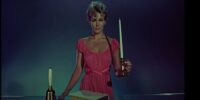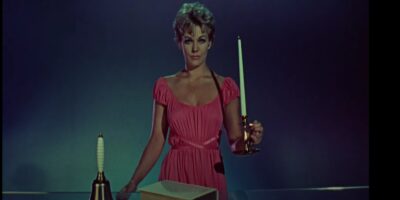
Love Hard is one of the more likeable offerings on Netflix, but its standout song has got a bit of a problem. Being a fan of classic movies, I have seen the original version of the song “Baby, it’s Cold Outside” performed in the film Neptune’s Daughter from 1949. Despite all of the flak the original song has gotten, it is important to note that it was never intended to be a Christmas song, and the lyrics are heard out of context.
You can check out Neptune’s Daughter on YouTube (rent/purchase) and Amazon Prime Video (rent/purchase).
The Song’s Background
The song “Baby, it’s Cold Outside” was actually never intended to be used in a movie at all. When Frank Loesser wrote it in 1944 to amuse his party guests, it was for him and his wife to sing at their housewarming party as a signal to guests that it was time to leave. It was meant to be lighthearted and fun, but people have turned it into this twisted thing.
His wife was furious when he sold the song to MGM since it had been a private thing for the two of them. They were originally going to use the song “(I’d Like to Get You on a) Slow Boat to China” in the film, but that song was deemed too suggestive, so they went with “Baby, it’s Cold Outside.” This change seems ironic because now “Baby, it’s Cold Outside” has a stigma of being a song of manipulation, where the man is trying to talk a woman into staying the night.
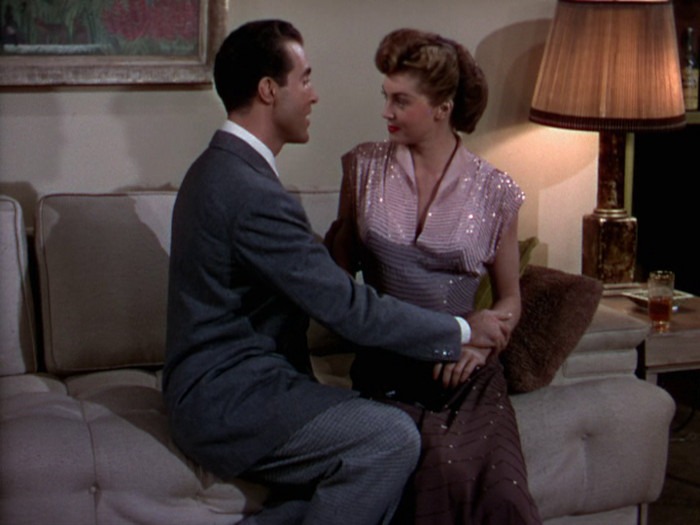
Here is Love Hard’s rendition:
Due to the controversy over the lyrics, Love Hard writers decided to put a twist on the original lyrics by changing the male singer’s part. In the original, the man is trying to talk the woman into staying when she says she should leave. In the movie Love Hard, Natalie has a strong negative reaction when some senior citizens ask her to perform the song. She rather bluntly say:
“I am not singing that, that is like the sexual assault theme song.”
Pretty brutal reaction, right? One which demonizes an Academy Award-winning song that began getting criticized around 2007 with the #MeToo era when the lyrics to the 1949 song were trying to be understood by a different generation. Certain radio stations stopped playing it due to complaints, and the version in Love Hard isn’t the first time the lyrics have been changed. Natalie’s love interest changes the lyrics as they go along. In these new lyrics, the man agrees and offers help for her to leave:
Girl: The neighbors might think
Boy: It’s just my old friend Troy
Girl: Say what’s in this drink?
Boy: It’s just lemon LaCroix
Girl: I wish I knew how
Boy: To take a hint?
Girl: To break the spell
Boy: Do you know how to spell ‘farewell’?
Neptune’s Daughter lyrics:
Girl: The neighbors might think
Boy: But Baby, it’s bad out there
Girl: Say, what’s in this drink?
Boy: No cabs to be had out there
Girl: I wish I knew how
Boy: Your eyes are like stars right now
Girl: To break this spell
Boy: I’ll take your hat, your hair looks swell
Misunderstanding the Times
While the main focus of the original song is a woman being coerced into staying longer with the man, you see above that the song in Neptune’s Daughter not only features the duet as we’re used to, but it also flips genders with Betty Garrett and Red Skelton singing opposite parts.
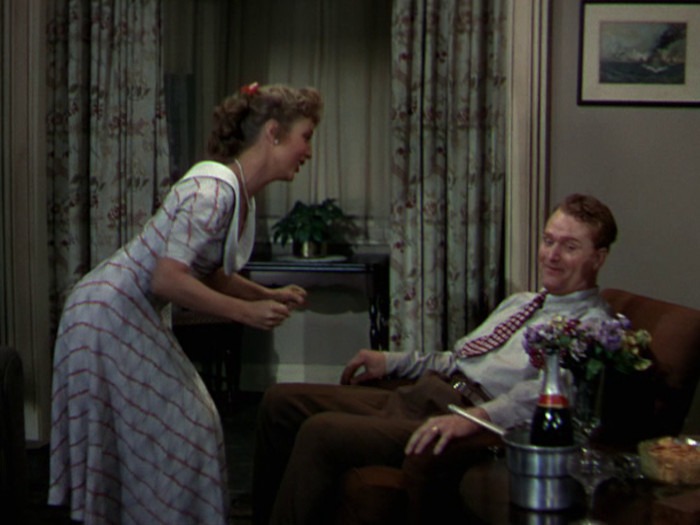
In this movie, it was not intended just as a man trying to talk a woman into staying the night, but there’s the whole flip side where another woman is doing the same thing to a man. People tend to ignore this part of the song and focus on the just the man-wooing-woman part, where really it’s a dance between two people, not some show of manipulative masculinity. Seeing the song in Neptune’s Daughter helps add some much needed context.
Both couples in Neptune’s Daughter are flirting – unsure of whether to give into their feelings for each other. You need to remember the time frame in which this song was written and the original context before demonizing it.
The 2007 public turned the flirty song into something weird, and the film Love Hard keeps perpetuating the idea. People have read so much into the song that they think it has an air of coercion, when it’s just a flirty song about a woman who wants to stay but is fighting with herself about it, and a man on the flip side of the duet wanting to stay with a woman. The concept isn’t that strange.
The Song’s Original Intent and the Lyrics
As I mentioned above, the song was initially written to signal people to get out of Loesser’s home and this is what was used in the film Neptune’s Daughter. The line “What’s in this drink?” despite what it sounds like, is not to signal that the man put anything nefarious in it, but simply the level of alcoholic content in it. The version in Love Hard takes it a step further by saying that it’s a nonalcoholic drink.
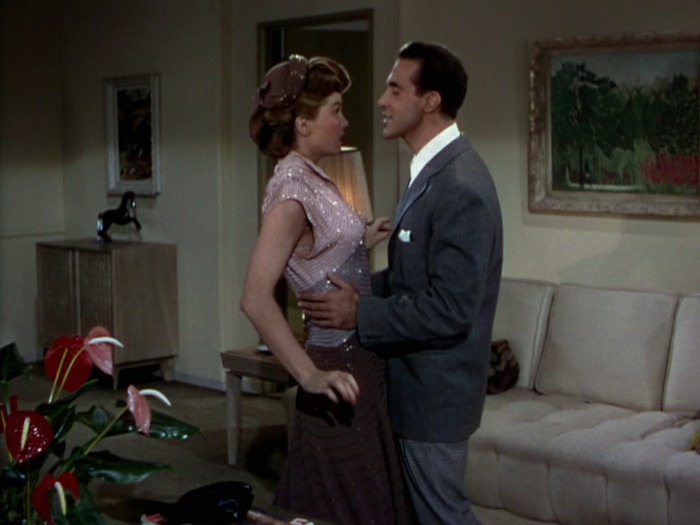
At the time when the original was written, women were not socially permitted to spend the night with their boyfriend or fiancé. The line about the drink was a common idiom at the time that was used to get around these social expectations by the woman being able to justify her actions by having been drunk. It turns out that she wanted to stay as much as he wanted her to. The song is a back and forth over her own decision-making about wanting to stay even though it wasn’t appropriate by social standards.
The consequences for women at the time would’ve been steep, and reputations were fragile, so women were taught to hide their sexual desires. Contraception was illegal in most states, and women could even be imprisoned if they were suspected of being promiscuous. This imprisonment was in a misguided effort to protect WWII American troops from sexually transmitted diseases.
The lyrics even highlight this by the woman saying that she ought to say ‘no’ and that the neighbors will gossip if they know she stayed over. It shows how women had to be more concerned about what other people thought in the 1940s because of the potential danger to themselves.

Love Hard adds to the idea that there is something sinister about “Baby, it’s Cold Outside” when there really isn’t. Is the song appropriate for a Christmas carol? Perhaps not, but it was never intended to be one. If it hadn’t been pulled into that, no one would have ever even noticed. By knowing more about the history, you can better understand the song for what it is: two people flirting in a distinctly 1940s style.
If you are looking for some more classic movie offerings, check out these classic monster and Hitchcock films.


